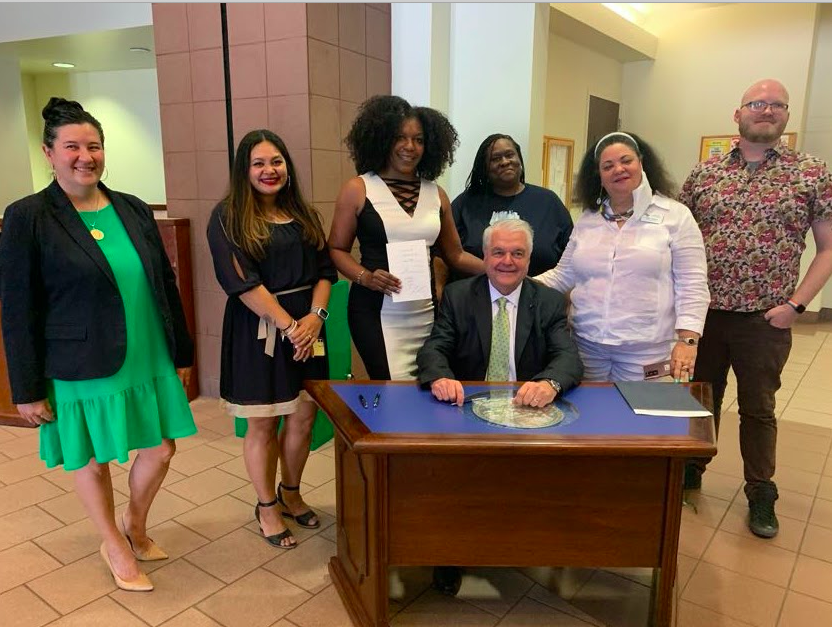New Laws Will End Widespread License Suspensions, Arrests, and Incarceration for Nevadans Struggling With Outstanding Traffic Debt
*Leisa Moseley, FFJC Nevada State Director, Available for Interviews*
Today, Governor Sisolak signed two pieces of legislation that will end Nevada’s widespread practice of issuing a bench warrant and suspending an individual’s driver’s license when they can’t afford to pay fines and fees from a minor traffic ticket.
AB 116 will decriminalize minor traffic violations — making them civil infractions and ending the widespread practice of issuing warrants for outstanding traffic debt. Nevada was one of only 13 U.S. states that still prosecutes minor traffic violations as criminal offenses, rather than as civil infractions.
“Prior to this legislation’s passage, people who were unable to pay traffic fines and fees for minor violations such as driving with an expired vehicle registration or driving with a broken tail light could be arrested and even incarcerated,” said Assemblywoman Rochelle Nguyen, lead sponsor of AB116.
Nevada’s Justice and Municipal Courts have issued hundreds of thousands of arrest warrants over the years. When the pandemic forced courts to close in March last year, 270,000 traffic warrants were outstanding in the Las Vegas Justice Court alone.
Warrants are a counterproductive and expensive method of coercing people to pay a traffic ticket. In Clark County, the average person arrested on a traffic warrant spends almost three days in jail at a cost to taxpayers of over $400. The harm to the individual and their family is even greater. Three days in jail often costs a person their job, their housing, and even their children, making it far more difficult to earn the money to pay their court debt or to care for themselves or their families.
AB 116 builds on a successful model established by Carson City, which stopped issuing warrants in traffic cases in 2019. Carson City’s collection rate increased by 8.5% following implementation.
“These new laws are a win-win for struggling families and the Nevada economy,” added Leisa Moseley, FFJC’s Nevada State Director. “This is an important step toward ending our state’s two-tiered system of justice where poor people – and particularly communities of color – are disproportionately punished.”
A second bill, SB219, seeks to rein in rampant driver’s license suspensions resulting from traffic tickets that residents can’t afford to pay. Between July 2017 and June 2019, over 38,000 Nevadans had their driver’s licenses suspended because they couldn’t afford to pay court fines and fees.
SB219 was sponsored by Senate Majority Leader Nicole Canizzaro and co-sponsored by Assemblywoman Ceclia Gonzalez, who sponsored a similar bill in the Assembly. The legislation will help thousands of safe drivers regain the freedom to drive by automatically — and without cost — reinstating licenses that were suspended for court debt.
“This is a win for all Nevadans — especially those who have been caught in a cycle of poverty from traffic debt,” said Assemblymember Cecilia Gonzalez. “I am honored to have co-sponsored such an important piece of legislation that impacts the lives of our constituents.”
In just the last four years, 18 other U.S. states — including the neighboring states of Arizona, California, Idaho, Utah and Oregon — have passed major reforms to curb debt-based driver’s license suspensions.
Without a license, many Nevadans lose the ability to work, care for their children and access basic needs. Driving is such a necessity that 75% of people continue to drive after their license gets suspended. If they get pulled over, they can be arrested and jailed for driving on a suspended license, which is one of the most common criminal charges in Nevada. After arrest, people are saddled with more fines and fees, and are often incarcerated long enough to miss their rent payment or lose their job.
One study found that 42% of people lost their jobs after their driver’s license was suspended. Of those who found new work, 88% reported a decrease in pay. Another study from Phoenix, Arizona found the median annual income loss following license suspension was $36,800 per person.
President Biden’s platform includes fines and fees reform, while Vice President Harris previously co-sponsored the federal Driving for Opportunity Act. This bipartisan federal legislation — which was reintroduced this year and passed the Senate Judiciary Committee last month — would incentivize U.S. states to end debt-based driver’s license suspensions by providing them with extra federal funding. If the Driving for Opportunity Act is approved by Congress, Nevada will be eligible for those federal funds.
“Increasingly, savvy elected officials are realizing that ending the punishment of people that don’t have money isn’t just morally right, it’s politically smart,” said Leisa Moseley, Nevada State Director at the Fines and Fees Justice Center (FFJC). “At a time when so many Nevada residents are struggling to meet their basic needs, criminalizing poverty only adds fuel to the fire.”
#######
Read more about this issue:
Las Vegas Review-Journal
COMMENTARY: Time for Nevada to End Modern-Day Debtors’ Prisons
By Leisa Moseley, FFJC Nevada State Director
May 1, 2021
NBC News
In Nevada, drivers can be arrested for unpaid tickets. Activists are fighting to change that.
May 8, 2021
